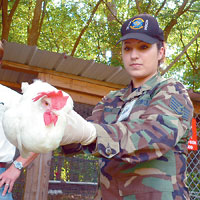Chickens enlist for West Nile warning system
By Turner Walston
Published in News on August 24, 2005 1:47 PM
One of the most important jobs at Seymour Johnson Air Force Base is for the birds.
Chickens are being used to help base health official watch for signs of the West Nile virus.
Through a partnership with the Wayne County Health Department, the 4th Medical Group at Seymour Johnson is using chickens to detect any signs of the virus, which is spread by mosquitoes. Birds are often the first indicators of the presence of the disease in an area. West Nile is generally spread by mosquitoes that have fed on infected birds.

News-Argus/Turner Walston
Staff Sgt. Jenny Johnson prepares to take a blood sample from a chicken on Seymour Johnson Air Force Base. The chickens, part of a joint project between the 4th Medical Group and Wayne County Health Department, are used to detect West Nile virus.
The virus is a potentially serious illness that affects the central nervous system in humans. Almost 80 percent of people with the virus will show no symptoms, with 20 percent experienced mild symptoms, including fever, headache, body aches and nausea. About one in 150 people infected will develop severe symptoms that could include paralysis, coma or disorientation.
A teenager in Pitt County was diagnosed with West Nile last month. The girl, who was the first reported case of the virus in the state this year, is now recovering at home.
Lt. Col. Joe Schurhammer is the public health flight commander of the 4th Medical Group. A veterinarian, Schurhammer said the medical group and the county health department work together on issues that affect both Air Force personnel and county residents.
The county purchased the chickens and supplies the feed. The base provides the personnel to test them.
Every two weeks, the 4th Medical Group sends blood samples to the state Department of Health and Human Services for testing. If virus antibodies appear in the chickens' blood, then it is sent to the state's laboratories. In the two years of the program, no chicken from the base has shown signs of infection.
Schurhammer said the birds that contract the virus usually do not die from it.
"They are our sentinels," he said. If a chicken were to become infected, it would give the human population advance notice. The animals give us a week to two weeks warning. It's not foolproof, but it is a first alert."
Mosquitoes are also trapped on base for study. Kevin Whitley, county environmental health director, said this practice enables officials to "create a baseline of the mosquito population."
Whitley said the sentinel flock of chickens is a proven way to avoid outbreaks of the virus.
"It's going really well," he said.
Schurhammer said the partnership is another example of the cooperation between Wayne officials and the military.
"We try to help each other whenever we can. Something that affects them will probably affect us," Schurhammer said. "Health issues stretch across that gate."
